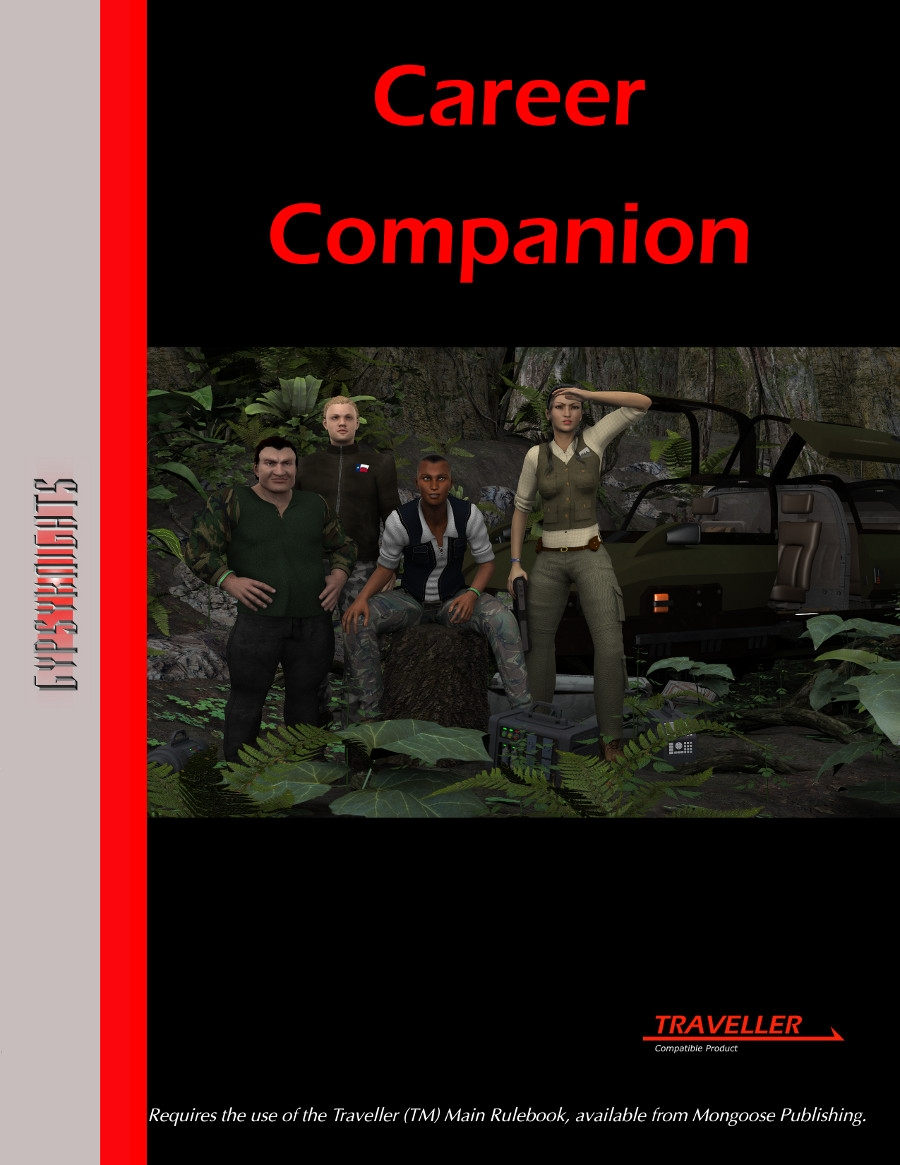Career Companion
This article originally appeared in the January 2015 issue.
 Career
Companion. John Watts.
Career
Companion. John Watts.
Gypsy Knights Games http://www.gypsyknightsgames.com
60pp., softcover or PDF
US$15.99(S+P)6.99(P)/UKú10.27(S+P)4.49(P)
Disclosure: The reviewer was comped a copy of this at TravellerCON.
Prior careers. They’re a key part of Traveller character creation, and pretty much everyone wants to customize them in some way. Maybe the setting requires a different career organization (“My Planetary Defense Force includes the oceanic navy. Why can’t I get ‘watercraft’ from the Navy skills list?”), or maybe the ‘standard’ available careers just aren’t right (“My character is a journalist. She’s not an ‘agent’. There isn’t really that much overlap.”). Whatever the reason, customized careers are probably one of the earliest ‘house rules’ that a gaming group comes up with.
Clement Sector is no different, in that sense. While some of the standard careers can be used with this alternative setting, the core setting book notes that some career tracks are inappropriate, or that some things must be interpreted differently. So, John Watts and Gypsy Knights Games have gone ahead and assembled a collection of Clement Sector-specific careers. There’s overlap with some of the core rulebook careers, but these careers have a very definite Clement Sector flavor to them, and have to be considered a better fit for the setting than the ‘equivalent’ core careers. They also go beyond the standard careers in some ways; what might be a single career track within a career in the standard rule books can be expanded into a full career with its own career tracks here, and there’s one entire career (Orbital Construction) that wasn't even a single career track in the standard rules.
But that’s not all you get with the Clement Sector Career Companion. The core setting book notes that there aren’t any aliens in the setting—but this book reveals that there are alternatives that can potentially be just as interesting: Uplifts and Altrants. Uplifts, as the classification implies, are animals that have been modified to have human (or very-near-human) intelligence, and taking advantage of certain basic traits where the animal form in question might have advantages over unmodified (‘baseline’) humans. Altrants are modified humans, intended to have advantages in certain environments that can cause problems for baseline humans. While the range of Altrants isn’t quite as wide as that of Uplifts, in terms of the advantages they provide, the high points are hit, and Altrants don’t suffer from quite the same level of social disability that Uplifts do.
Another complaint about the standard Traveller rules is that there’s no real way to improve your character once you're done with the generation sequence. This is another area where house rules often fill the gap, and the Clement Sector setting is no different. The rules here make use of ‘character points’, where it is assumed that the referee will award one character point to each character at the end of a session, possibly two if the character was played really well. Character points are accumulated over time, and may be spent to improve skills or attributes when sufficient points have been accumulated. As written, you can only improve a skill or attribute one step at a time, and you must gain level 0 in a skill before you can go up from there, so gaining high levels of skills or high attributes is expensive, and takes quite a long time (to gain level 0 in a skill requires 10 character points, but to go from level 2 to level 3 requires 25; similarly, you can go from STR 1 to STR 2 for 10 character points, but to go from STR 8 to STR 9 costs 45. Each specialization within a skill is treated as a separate skill for improvement purposes—you can’t improve “Art”, but you can improve “Art (Dancing)”, and it’s separate from improving “Art (Acting)” or “Art (Painting)”.).
Clement Sector doesn’t have nobility; social status is a matter of wealth (and the visible trappings thereof), prestige, and power. It also has a requirement that you spend to maintain that social status (after all, nobody is going to care—or know—that you’re the richest person on the planet, if you wander around looking like an anonymous derelict). Spending on SOC maintenance is also an easy way to change your SOC; if you fail to maintain the indicated level of spending over six months, your SOC will drop; if you “overspend” for a year, your SOC will rise. It’s the long-term (six months to a year) average that matters, so while you do need to keep an eye on your income and spending, it’s probably not necessary to go down to the level of entering daily expenses into a money-management program. It’s also reasonable to assume that some of that spending is for maintaining public prestige; paying for the party’s dinner at an expensive restaurant might be good for a few hundred or maybe a couple of thousand (depending on the restaurant) credits of your required SOC spending.
Aging in the Clement Sector setting is quite different from standard Traveller—the average lifespan is on the order of 250 years, and aging rolls don’t begin until age 76. The character also has far more control over his apparent age. This book provides guidelines, based on tech level, for the minimum apparent age that a character can maintain at a given actual age. Characters can, however, appear older if they feel it appropriate for their role.
If you’re going to be playing in the Clement Sector setting, this book belongs right next to the core Clement Sector setting book on your shelf. It’s less useful to mine for ideas to be used in other settings, as a fair amount of modification is likely to be required. Nevertheless, it would be hard to say that purchasing this would be a waste.
 Freelance
Traveller
Freelance
Traveller